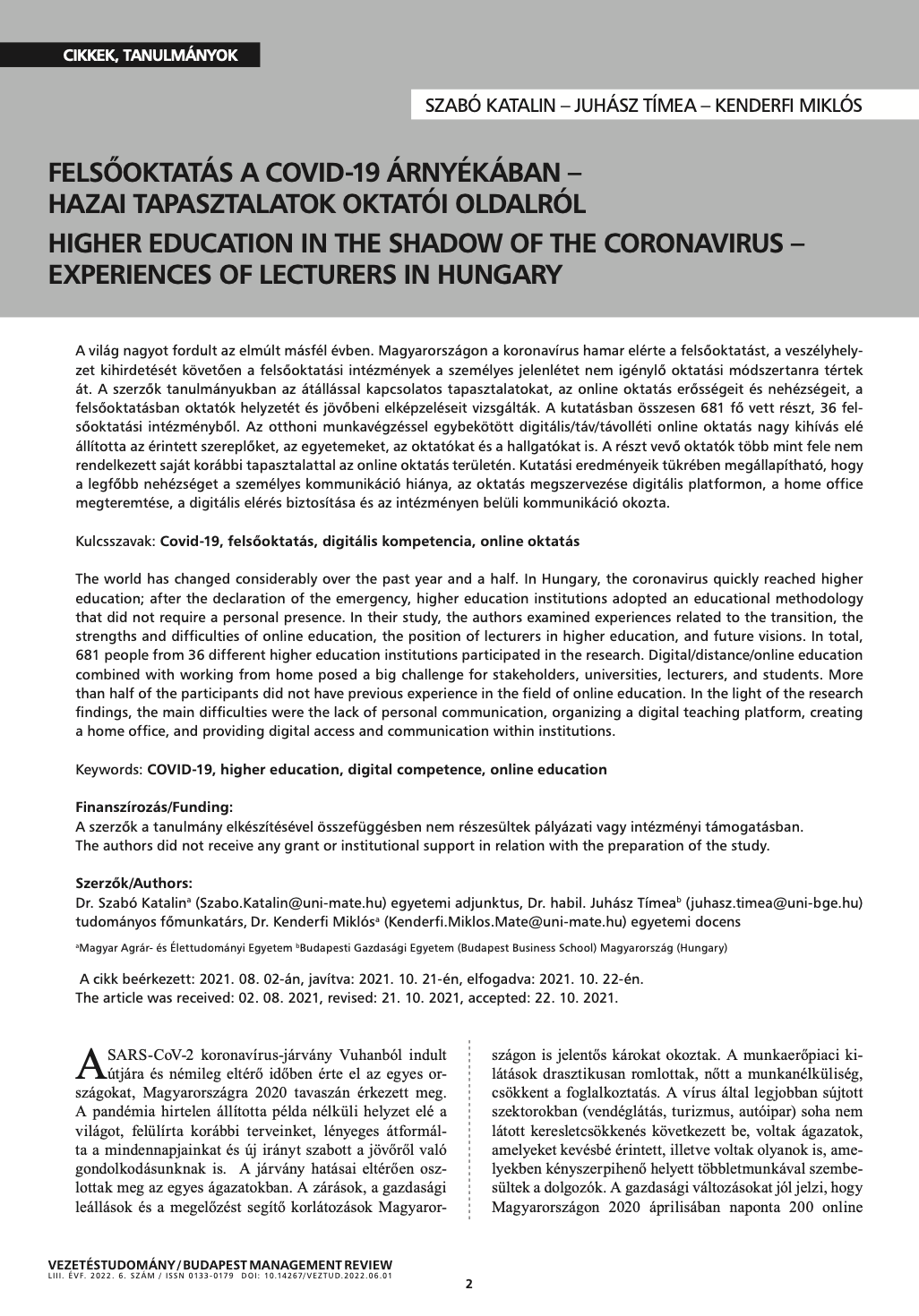Felsőoktatás a COVID-19 árnyékában
Hazai tapasztalatok oktatói oldalról
DOI:
https://doi.org/10.14267/VEZTUD.2022.06.01Keywords:
COVID-19, higher education, digital competence, online educationAbstract
The world has changed considerably over the past year and a half. In Hungary, the coronavirus quickly reached higher education; after the declaration of the emergency, higher education institutions adopted an educational methodology that did not require a personal presence. In their study, the authors examined experiences related to the transition, the strengths and difficulties of online education, the position of lecturers in higher education, and future visions. In total, 681 people from 36 different higher education institutions participated in the research. Digital/distance/online education combined with working from home posed a big challenge for stakeholders, universities, lecturers, and students. More than half of the participants did not have previous experience in the field of online education. In the light of the research findings, the main difficulties were the lack of personal communication, organizing a digital teaching platform, creating a home office, and providing digital access and communication within institutions.
Downloads
References
Beech, N. & Anseel, F. (2020). COVID-19 and Its Impact on Management Research and Education: Threats, Opportunities and a Manifesto. British Journal of Management, 31, 447–449. https://doi.org/10.1111/1467-8551.12421
Benedek A. (2020). Távoktatás másként!!! – A digitális kor pedagógiai kihívásaihoz. Opus et Educatio, 7(3), 185-192. http://opuseteducatio.hu/public/oepp/OpEE_202003.pdf
Chira Cs. (2020). A digitális kompetencia keretrendszerei és a pedagógusok digitális kompetenciája. In A kultúraváltás hatása az egyéni kompetenciákra: a digitális kompetencia modelljei (pp. 38-57). Eger: Eszterházy Károly Egyetem Líceum Kiadó.
Czirfusz D., Misley H. & Horváth L. (2020). A digitális munkarend tapasztalatai a magyar közoktatásban. Opus et Educatio, 7(3), 220-229. http://opuseteducatio.hu/public/oepp/OpEE_202003.pdf
Cserné Adermann G. (2020). Távoktatás: a levelezéstől a digitális oktatásig. Civil Szemle, 17(különszám), 7-22.
DIGI-HE. (2020). Supporting European Universities in their Strategic Approaches to Digital Learning. Brussels. https://www.eua.eu/resources/projects/772-digi-he.html
Digitális Oktatási Stratégia (2016). Kormány-előterjesztés melléklete.
Ehlers, U-D. & Bonaudo, P. (2020). DIGI-HE – A Strategic Reflection Tool on Digitalisation at European Higher Education Institutions. Human and Artificial Intelligence for the Society of the Future. European Distance and E-Learning Network (EDEN) Proceedings 2020 Annual Conference. Timisoara, 22- 24 June, 2020. https://doi.org/10.38069/edenconf-2020-ac0027
Fekete T. & Porkoláb Á. (2020). Karanténpedagógia a magyar közoktatásban – A digitális oktatásra történő átállás eddigi tapasztalatairól. Iskolakultúra, 30(9), 96-112. https://doi.org/10.14232/ISKKULT.2020.9.96
Fokozatváltás a felsőoktatásban szakpolitikai stratégia. (2016). Középtávú szakpolitikai stratégia.
Gelencsér M., Szigeti O. & Szabó-Szentgróti G. (2020). A feldolgozóipari munkavállalók munkaerő-megtartása. Vezetéstudomány, 51(9), 67-79. https://doi.org/10.14267/VEZTUD.2020.09.06
Giannini, S. (2020). Build back better: Education must change after COVID-19 to meet the climate crisis. Paris: UNESCO.
Gonda Gy. (2020). Covid és felsőoktatás – Forradalom a virtuális tantermekben. Az Üzlet – A Gazdaság Magazinja.
Hargitai D. M., Sasné Grósz A. & Veres Z. (2020). Hagyományos és online tanulási preferenciák a felsőoktatásban – A COVID-járvány kihívásai. Statisztikai Szemle, 98(7), 839-857. https://doi.org/10.20311/stat2020.7.hu0839
Jarjabka Á., Kuráth G., Sipos N., Venczek-Szakó T., Szabó-Bálint B., Balogh G. & Uhrin A. (2020). Rugalmasság, produktivitás vagy elszigeteltség? Avagy a Covid-19 hatása a felsőoktatásban oktatók munkavégzésére. Magyar Tudomány, 181(12), 1698–1710. https://doi.org/10.1556/2065.181.2020.12.14
Majó-Petri Z., Szakál P. & Görög V. (2021). Karantén online oktatás a Szegedi Tudományegyetemen: Mit tapasztaltak a diákok? In Buda A. & Molnár Gy. (szerk.), Oktatás – Informatika – Pedagógia 2021. (pp. 170-183). Debrecen: Debreceni Egyetem Nevelés- és Művelődéstudományi Intézet.
Marinoni, G., van’t Land, H. & Jensen, T. (2020). The Impact of COVID-19 on Higher Education Around the World. IAU Global Survey Report. Paris: IAU.
Molnár Gy. (2020). Kutatás-fejlesztés és innováció az oktatásban: A „Szegedi Műhely” informatikai fejlesztései és gyakorlati alkalmazásuk. Civil Szemle, 17(különszám), 93-103.
Oktatási Hivatal (2021). Ajánlás a személyes találkozás nélküli oktatás-nevelés lehetséges módszereire és eszközeire.
Oktatási Hivatal (2021). Felsőoktatási statisztikák. Felsőoktatási statisztikai adatok, letölthető kimutatások (2018).
Ollé J. (2010). Egy módszer alkonya: a katedrapedagógia végnapjai a felsőoktatásban. In Dobó I., Perjés I., Temesi J. (szerk.), „Korszerű felsőoktatási pedagógiai módszerek, törekvések” Konferencia előadások (pp. 22-31). Budapesti Corvinus Egyetem Közgazdaságtudományi Kar Nemzetközi Felsőoktatási Kutatások Központja. NFKK FÜZETEK 5. Budapest: AULA Kiadó Kft. http://unipub.lib.uni-corvinus.hu/1231/1/NFKK_5_vegleges.pdf
OWL Labs (2020). State of the remote work.
Pankász B. (2016). Online oktatási környezet és IKT tényezők összehasonlító vizsgálata a felsőoktatásban (Doktori (PhD) értekezés tézisei). Pécs: Pécsi Tudományegyetem.
Polónyi I. (2021). Pandémiás oktatás. Educatio, 30(1), 3–21. https://doi.org/10.1556/2063.30.2021.1.1
Prensky, M. (2001). Digital Natives, Digital Immigrants. On the Horizon, 9(5), 1-6.
Perger J., Péterfi Cs. & Ardelean A. (2020). Kényszerpihenő helyett túlórák – Avagy kik a COVID-19 nyertesei? PwC.
Serfőző M., Golyán Sz., F. Lassú Zs., Svraka B. & Aggné Pirka V. (2020). Digitalizáció és online tanulás a pedagógusképzésben – hallgatói visszajelzések a távolléti oktatásról. Civil Szemle, 17(különszám), 105-116.
Sipos N., Jarjabka Á., Kuráth G. & Venczel-Szakó T. (2020). Felsőoktatás a Covid-19 szorításában: 10 nap alatt 10 év? Civil Szemle, 17(különszám), 73-91.
Škare, M., Soriano, D. R. & Porada-Rochon, M. (2021). Impact of COVID-19 on the travel and tourism industry. Technological Forecasting & Social Change, 163, 120469. https://doi.org/10.1016/j.techfore.2020.120469
Tóth-Kaszás N., Németh K. & Michalec G. (2021). A humánerőforrás-fejlesztés kihívásai a digitális átállás fényében – Kihívások, reakciók, törekvések és várakozások. Vezetéstudomány, 52(4), 80-92. https://doi.org/10.14267/VEZTUD.2021.04.07

Downloads
Published
How to Cite
Issue
Section
License
Copyright (c) 2022 Vezetéstudomány / Budapest Management Review

This work is licensed under a Creative Commons Attribution 4.0 International License.
Authors assign copyright to Vezetéstudomány / Budapest Management Review. Authors are responsible for permission to reproduce copyright material from other sources.

